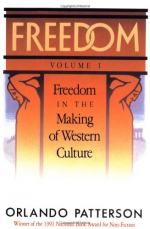
|
| Name: _________________________ | Period: ___________________ |
This test consists of 15 multiple choice questions and 5 short answer questions.
Multiple Choice Questions
1. The concern with personal freedom basically results from whom?
(a) Female slaves of the period.
(b) Male landowners of the period.
(c) Female landowners of the period.
(d) Male slaves of the period.
2. What does it mean to be Greek?
(a) To be special.
(b) To be enslaved.
(c) To be an outcast.
(d) To be free.
3. According to Patterson, what are the three components of freedom?
(a) Individual, unique, and social.
(b) Personal, sovereignal, and civic.
(c) Formal, informal, and community.
(d) Ruler, kingdom, and peasant.
4. In what revolution does the slaveholder become economically dependent on the slave for his own financial well-being?
(a) The political revolution.
(b) The economic revolution.
(c) The social revolution.
(d) The freedom revolution.
5. Who destroys the Athenians system of democracy in 322 B.C.?
(a) The Turks.
(b) The Macedonians.
(c) The Mongols.
(d) The Persians.
6. Slavery is more than just what kind of problem?
(a) In legal status.
(b) In social status.
(c) In personal status.
(d) In sovereignal status.
7. To what can the development of freedom as a social value be traced?
(a) Five revolutions that occurred in Rome between 7 and 4 B.C.
(b) Five revolutions that occurred in Rome between 4 and 7 A.D.
(c) Five revolutions that occurred in Athens between 7 and 4 B.C.
(d) Five revolutions that occurred in Athens between 4 and 7 A.D.
8. Who does the slave in this culture have?
(a) His friends.
(b) His mother.
(c) His family.
(d) The slave master.
9. What is the third revolution, which involves the emergence of democracy?
(a) A political revolution.
(b) A philosophical revolution.
(c) An economic revolution.
(d) A social revolution.
10. When is this view of Mortal life beginning to be questioned?
(a) By the end of the sixth century B.C.
(b) By the end of the fifth century B.C.
(c) By the middle of the sixth century B.C.
(d) By the middle of the fifth century B.C.
11. Personal freedom awareness results from the role of what Greeks?
(a) Slaves.
(b) Men.
(c) Women.
(d) Non-natives.
12. To what does this lead?
(a) All women commiserating and identifying with their friends and relatives.
(b) The upper and middle class women commiserating and identifying with the slaves.
(c) The lower and middle class women commiserating and identifying with slaves.
(d) The lower and upper class women commiserating and identifying with their children.
13. On what is there greater reliance to produce the necessary revenues?
(a) The slave-operated grain mills.
(b) The slave-operated silver mines and urban craft industries.
(c) The slave-operated grain fields.
(d) The slave-operated grain fields, mills, and shops.
14. Athens experiences how many results from the transition to a slave economy?
(a) Eight.
(b) Three.
(c) Ten.
(d) One.
15. What dictates mortal life?
(a) Decisions made by each individual.
(b) Accident.
(c) Evolution.
(d) Fate.
Short Answer Questions
1. How are the living conditions of many Athenian women?
2. What is also a factor contributing to the social conflict of this time?
3. A social reaction between slave, slaveholder and society must take place in order for what to happen?
4. What are palatine centralism, decentralized tribalism, rudimentary state formation and aristocratic resurgence?
5. The whole fabric of society exists around and is dependent on what?
|
This section contains 527 words (approx. 2 pages at 300 words per page) |

|




